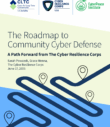Filter & Sort
| Date | Type | Research Item | Topics |
|---|---|---|---|
|
June 17, 2025 |
White Paper |

The Roadmap to Community Cyber Defense: A Path Forward from the Cyber Resilience CorpsBy: Sarah Powazek, Grace Menna Community organizations — including nonprofits, hospitals, schools, local utilities, city governments, and small businesses — deliver vital services to the public, but they are often the least prepared to… |
|
|
May 13, 2025 |
Blog Post |

Reflections on Cybersecurity Futures 2025: Looking Back from the PresentBy: Nick Merrill, Steven Weber In this article, Nick Merrill and Steve Weber conduct a “postmortem” analysis of the Cybersecurity Futures 2025 scenarios, which were written in 2020. The authors look at what they got right — and wrong — and what it means for our understanding of changes and trends in technology and digital security. |
artificial intelligence (AI)data economydeep fakedigital harmsglobalizationgovernanceinfrastructureinternet fragmentationmisinformationprivacyquantumscenariossurveillancesynthetic media (deepfakes) |
|
May 12, 2025 |
Blog Post |

Slashing EPA funding may have downstream cybersecurity impacts on an already vulnerable water sectorBy: Shannon Pierson America’s water and wastewater utilities rely on the Environmental Protection Agency for cybersecurity support and guidance. With the EPA’s funding on the Trump Administration’s chopping block, America’s water… |
digital harmshomeland securityinfrastructurenational securitypublic interest cybersecurity |
|
May 8, 2025 |
White Paper |

Survey of Search Engine Safeguards and their Applicability for AIBy: Evan R. Murphy, Nada Madkour, Deepika Raman, Krystal Jackson, Jessica Newman, Survey of Search Engine Safeguards and their Applicability for AI A new research paper from the Center for Long-Term Cybersecurity examines how safeguards designed for search engines could be adopted by developers of AI systems like ChatGPT. The… |
artificial intelligence (AI)data sharingdigital harmsengineeringhomeland securitymachine learning (ML)misinformationnational security |
|
April 16, 2025 |
White Paper |

The South Korean Digital Paradox: How South Korea’s Internet Development Model Creates Unique Cybersecurity VulnerabilitiesBy: Nick Merrill, The South Korean Digital Paradox: How South Korea’s Internet Development Model Creates Unique Cybersecurity Vulnerabilities South Korea is home to one of the world’s most robust digital infrastructures, largely as a result of a government-led development model that has favored domestic technologies. Nearly… |
governanceinfrastructureinternet fragmentationmisinformationpolicyriskscenarios |
|
March 31, 2025 |
White Paper |

Managing Commercial Spyware Through Export Controls: Lessons Learned from the Wassenaar ExperienceBy: Elaine Korzak A new white paper from the Center for Long-Term Cybersecurity explores the use of international export controls to limit the dissemination of commercial spyware technologies. The paper, “Managing… |
digital harmsgovernancelaw enforcementnational securitypolicyprivacysurveillance |
|
February 3, 2025 |
White Paper |

Intolerable Risk Threshold Recommendations for Artificial IntelligenceBy: Deepika Raman, Nada Madkour, Evan R. Murphy, Krystal Jackson, Jessica Newman January has already seen the release of new frontier models that are creating waves with unprecedented innovation in their development and uplift in their capabilities. Simultaneously, we are… |
|
|
January 29, 2025 |
White Paper |

Impacts of Open Radio Access Networks for Operators, Policymakers, and ConsumersBy: Jon Metzler A new white paper published by the UC Berkeley Center for Long-Term Cybersecurity examines the implications of “open radio access networks,” or Open RAN, a movement focused… |
|
|
January 28, 2025 |
White Paper |

AI Risk-Management Standards Profile for General-Purpose AI (GPAI) and Foundation ModelsBy: Anthony Barrett, Jessica Newman, Brandie Nonnecke, Nada Madkour, Dan Hendrycks, Evan R. Murphy, Krystal Jackson, Deepika Raman The first annual update to the AI Risk-Management Standards Profile for General-Purpose AI Systems (GPAIS) and Foundation Models (Version 1.1) has been published by a team of researchers… |
|
|
November 27, 2024 |
Grant |
Avenger: Looking Into The Future of Internet Censorship With Artificial Intelligence AlgorithmsBy: Changcheng Fan Internet censorship is a critical human rights issue, as the internet has rapidly become the primary mode of communication globally. While many censorship circumvention tools exist, they are… |

